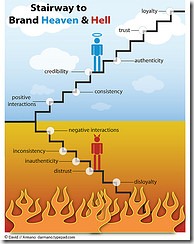by Diane Holmes
Last we spoke on Author Branding, the conversation included Zombies and we hashed over whether “brand” is actually a curse word in disguise.
Brand ourselves? (All together now….) Like products?! You mean come up with a way to sum up our uniqueness?
And yet if I ask you if all writers are alike and can all write the same thing, there’s not a writer reading this column who won’t argue that we’re each original, have individual voices, and are not in any way interchangeable. (I think there’s a marketing word for pointing out unique qualities…. )
Wait. I’m pausing to see if anyone saying, “Oh noes, I’m not original at all. I strive to be a generic author, and I’m hoping that if another writer comes along, they’ll cast me aside because (all together now), it’s not like I bring anything unique to the table.”
Crickets. (And they’re snickering.)
A Class On Branding Just for U
Today, I want to share Dan Amano’s video on the topic of people and brands. He founded Brand U.0 (“you point zero”), and I have a marketing crush on him.
This talk, given at the Chicago New Media Summit in 2008, is the best 20 minutes you’ll ever spend on building a personal brand.
First minute and a half showing the difference between a logo and a brand. J And just gets better and better!
Go watch RIGHT NOW. Then come back here.
Bottom Line Takeaway:
- Brand is not the product.
- Having a brand does not make you a product, because brand is about your gut.
- There’s a brand heaven and a brand hell based on how other people experience your brand. Your brand and influence exists whether you care or not.
- Online, personal brands happen in an organic way, celebrating niches.
- You know you’re a web-lebrity if you have an action figure in your own image.
- David has 5 aspects of building a personal brand. My favorite is “Be Remarkable.” That is the essence of every writer I know. we have remarkable things to say. We arrived remarkable, and we have a remarkable dream that doubles as a career. Pretty darn… remarkable.
- People who don’t create a personal brand still have them. They just don’t control them.
The Author’s Branding Manifesto
So, here’s what I want you to take away from this column on Author Branding.
- Writers create meaning.
- Branding creates meaning.
- This is your chance to bring meaning to your personal brand (how others see you), instead of letting someone else do it.
- It’s a creative act.
- It’s not our enemy or a curse. It’s our finest work brought to life.
- And it’s the most creative thing we’ll ever do for our careers.
—
Note: In the video, David mentions presentations on Slide Share. You can find them here.
This is the second in a series on Author Branding. Previous articles include:
#1 Author Branding vs. an Army of Writers
.—
 Diane writes two columns for Freelance-Zone:
Diane writes two columns for Freelance-Zone:
- Fiction-Zone: Leaps in Fiction Mastery and
- Marketing-Zone: Marketing-Zone: Marketing Yourself and Your Book. She’s the Founder and Chief Alchemist of Pitch University – “Learn to pitch your book from the AGENTS and EDITORS who make their living at it. Learn. Pitch. Sell.”




